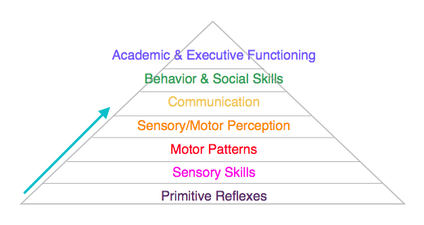Specialty Treatment Areas
Individualized treatment programs provided based on professional assessment.
Individualized treatment programs provided based on professional assessment.

1. Primitive Reflexes
We are born with a body and a nervous system, but without “knowledge”. What we do have is our primitive reflexes. A reflex is simply a pattern of behavior that is not under voluntary control it comes from the lower brain stem centers where no conscious thought occurs— so they are completely automatic.
Reflexes are the foundation for motor control. As we move during infancy and toddler years, our movement phases out the primitive reflexes allowing us to actively control our movement.
This integration of the primitive reflexes indicates a mature central nervous system and it provides a strong basis for increasingly sophisticated voluntary movement which ultimately leads to effective learning.
*Without proper integration, the primitive reflexes continue to be active and can adversely affect neuromuscular coordination, sensory perception, emotions, and the ability to think and express oneself clearly.
2. Sensory Skills
Sensory processing is the term used to describe how our nervous system takes in sensory information around us using our senses: touch, taste, smell, movement, vision and hearing. When a nervous system is functioning properly it is able to take in information, organize it, attach meaning to it, and act on it accordingly. Difficulties arise as a result of neurological disorganization within this process.
We are born with a body and a nervous system, but without “knowledge”. What we do have is our primitive reflexes. A reflex is simply a pattern of behavior that is not under voluntary control it comes from the lower brain stem centers where no conscious thought occurs— so they are completely automatic.
Reflexes are the foundation for motor control. As we move during infancy and toddler years, our movement phases out the primitive reflexes allowing us to actively control our movement.
This integration of the primitive reflexes indicates a mature central nervous system and it provides a strong basis for increasingly sophisticated voluntary movement which ultimately leads to effective learning.
*Without proper integration, the primitive reflexes continue to be active and can adversely affect neuromuscular coordination, sensory perception, emotions, and the ability to think and express oneself clearly.
2. Sensory Skills
Sensory processing is the term used to describe how our nervous system takes in sensory information around us using our senses: touch, taste, smell, movement, vision and hearing. When a nervous system is functioning properly it is able to take in information, organize it, attach meaning to it, and act on it accordingly. Difficulties arise as a result of neurological disorganization within this process.
Children with these types of difficulties may exhibit:
|
☑poor attention, planning, or judgement
☑decreased ability to self calm ☑social or emotional challenges ☑abnormal high or low activity levels ☑poor self control of impulses ☑overly sensitive or under reactive to sensory information |
☑decreased body awareness
☑poor ability to transition ☑clumsiness ☑delayed motor or language skills ☑delayed academic performance |
